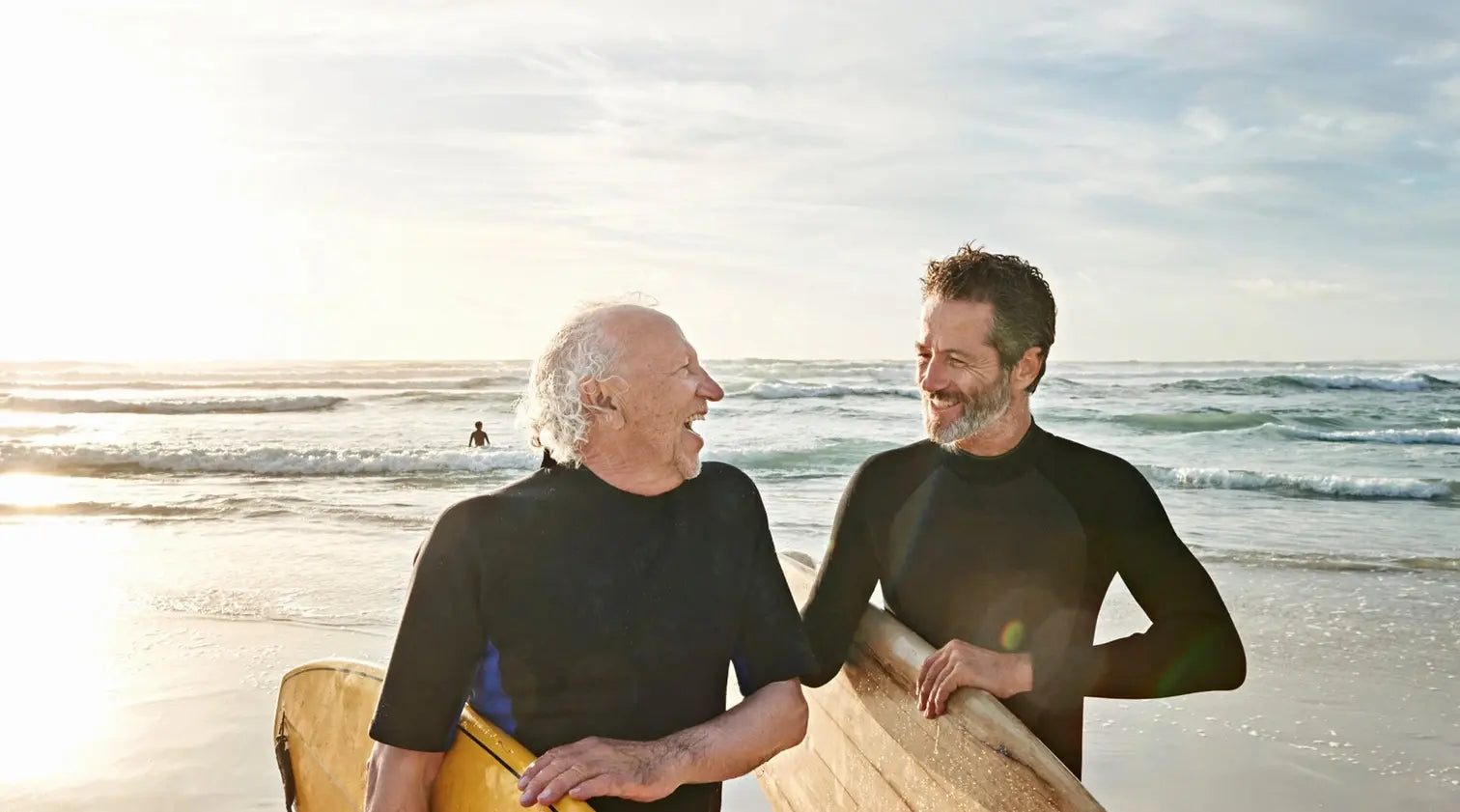Chronological Age versus Biological Age
What is Chronological Age?
What is Biological Age?
Lifespan vs. Healthspan
How is Biological Age Measured?
- Eat mindfully. Minimizing calories and adhering to a healthy diet is one of the most widely proven ways to reduce biological age. For example, a prominent study published in The Lancet evaluated the results from two years of calorie restriction in a group of non-obese men and women. The study found that calorie restriction improved all age-related risk factors for cardiovascular diseases. In fact, similar studies have been performed on multiple species, from rodents to primates, which all found that calorie restriction is a reliable way to extend longevity, partly because overconsumption, especially of processed foods, can lead to obesity, high-blood pressure, and inflammation which are linked to chronic and age-related diseases.[8],[9] Of course, life should be enjoyable as well, and so it's best to take a balanced approach when it comes to eating and focus on nutrition rather than counting calories. Additionally, a plant-forward diet can help improve heart health and boost the immune system. Research from the University of California in San Francisco discovered that adhering to a plant-based diet for three months positively affected the degradation of telomeres - another aspect of DNA that is closely correlated with biological age. Located at the ends of our DNA strands, telomeres’ length shortens as we age, which makes them a significant marker for biological age.[10]
- Get adequate sleep (7-9 hours for most). According to studies compiled by the American Academy of Sleep Medicine (AASM), sleep deprivation may age us quicker than we’d like to admit by speeding up biological aging, as proven by increased DNA damage in blood samples of sleep deprived individuals. Obtaining an adequate amount of sleep every night, on the other hand, slows the onset of physical aging, improves mental health, and reduces the risk for chronic disease.[11] In fact, according to world-renowned neuroscientist, Matthew Walker, the correlation between sleep and longevity is simple - “The shorter your sleep, the shorter your lifespan.”
- Exercise regularly. Physical exercise, specifically High-Intensity Interval Training (HIIT) can prevent telomere degradation and increase the ability for cell mitochondria to produce energy. A Mayo Clinic study of individuals ages 18 to 30 and 65 to 80 found that after three months of HIIT, mitochondrial energy output was boosted by 49 percent in the younger group and a remarkable 69 percent in the older group. In general, exercise also boosts blood flow, improving the cardiovascular system and nutrient delivery throughout the body.[12],[13]
- Consume antioxidants. Studies evaluating the role of antioxidants show that they are able to help counter the external factors that encourage the aging process, like free radicals and oxidative stress. Consuming foods high in antioxidants reduces oxidative stress on cells and prevents cellular destruction. Green leafy vegetables and colorful fruit are all rich in antioxidants and can slow biological aging.[14],[15]
- Maintain a healthy microbiome. A healthy microbiome boosts the immune system and prevents inflammation, leading to a younger biological age. For a healthy microbiome, the National Institute on Aging recommends avoiding sugars and processed foods. Consume a well-balanced diet that includes fermented foods like kefir and kombucha. What’s more, recent studies suggest that establishing a healthy skin microbiome can reduce the external signs of aging, like wrinkles and loss of elasticity.[16],[17],[18]
- Manage your stress levels. In a Brigham and Women’s Hospital (BWH) study published in PLoS, 5,423 middle-aged and older women who experience chronic anxiety had shorter telomeres, proving that stress can damage your body at the cellular level and accelerate your biological age. You can develop the ability to manage stress by meditating, avoiding triggers, and engaging in healthy leisure activities.[19],[20]
- Engage in your community. A 2018 study of 113 men and women found that loneliness can decrease telomere length, increasing the signs of aging. Therefore, your social circle is an important factor in reducing your biological age. To help slow the biological signs of aging, foster a supportive social environment for yourself and participate in community engagement.[21],[22]
- Have a positive mindset. A negative mindset adds unnecessary stress and can have an adverse effect on your mental health. In a 2019 study of both men and women, those who practiced an optimistic outlook were 11-15% more likely to have a longer lifespan. Keep your biological age in check by maintaining a positive mindset.[23]
Biological Age of Skin


Looking Forward
- Chronological age cannot be changed, but Biological age plays a major role in how you feel and function. While chronological age cannot be changed, biological age is malleable and can even be reversed, allowing you to look and feel younger than your chronological age.
- Aging clocks are tools that use biomarkers to assess the biological age of an organism.
- OneSkin’s MolClock is the first aging clock that works exclusively to determine the biological age of skin, allowing OneSkin to assess products and molecules for their effectiveness at rejuvenating skin on a molecular level.
- OneSkin’s proprietary peptide, OS-01, is scientifically proven to reduce skin’s biological age.
- By exercising, managing stress, and paying special attention to what we place into and onto our bodies, we can slow down—and even reverse— our biological age.
- https://pubmed.ncbi.nlm.nih.gov/29676998/
- https://www.niehs.nih.gov/health/topics/science/biomarkers/index.cfm
- https://medlineplus.gov/genetics/understanding/basics/gene/
- https://medlineplus.gov/genetics/understanding/howgeneswork/epigenome/
- https://www.thelancet.com/journals/ebiom/article/PIIS2352-3964(17)30142-1/fulltext
- https://www.sciencedirect.com/topics/biochemistry-genetics-and-molecular-biology/molecular-clock
- https://www.nature.com/articles/d41586-019-02638-w
- https://pubmed.ncbi.nlm.nih.gov/28531269/
- https://www.thelancet.com/journals/landia/article/PIIS2213-8587(19)30151-2/fulltext
- https://www.ucsf.edu/news/2013/09/108886/lifestyle-changes-may-lengthen-telomeres-measure-cell-aging
- https://aasm.org/partial-sleep-deprivation-linked-to-biological-aging-in-older-adults/
- https://www.newscientist.com/article/2123825-best-anti-ageing-exercise-is-high-intensity-interval-training/
- https://www.sciencedirect.com/science/article/abs/pii/S0091743517301470
- https://papers.ssrn.com/sol3/papers.cfm?abstract_id=3074497
- https://www.sciencedirect.com/science/article/pii/S2405844020309518
- https://pubmed.ncbi.nlm.nih.gov/31967716/
- https://www.nia.nih.gov/news/unique-gut-microbiome-patterns-linked-healthy-aging-increased-longevity
- https://parjournal.net/article/view/4051
- https://www.eurekalert.org/news-releases/666133
- https://www.apa.org/monitor/2014/10/chronic-stress
- https://academic.oup.com/abm/article/53/6/541/5071789?login=true
- https://www.sciencedaily.com/releases/2020/06/200618094625.htm
- https://www.pnas.org/content/116/37/18357
- Boroni, M. et al. Clinical Epigenetics, 2020
- Zonari, A., et al. npj Aging, 2023
- https://www.instyle.com/beauty/health-fitness/reverse-aging-longevity-research



